As a combination of trekking and climbing Everest Base Camp and Island Peak adventure, this adventure requires you to fall in love with mountains. At the same time, you must be at a great fitness level. While on this EBC Trek with Island Peak Climbing adventure, you can witness the incredible beauty of the mountains in the Everest region. Join us for a memorable journey of Island Peak climbing with EBC for 20 days, where you’ll navigate the Everest Base Camp trail and ascend the stunning Island Peak.
Departs from Kathmandu, Nepal
Overview
If you are a person who loves adventure and mountains, you can go on a fantastic combination of trekking and climbing adventures. Everest Base Camp Trek with Island Peak Climbing offers a thrilling adventure of your lifetime. Our Island Peak climbing with EBC 20 days provides an exciting combination of trekking to Everest Base Camp and summiting the renowned Island Peak.
This Everest Base Camp and Island Peak adventure combines two beautiful adventures in the mountains at a go. Everest Base Camp and Kalapathar Trek are the most popular treks in the mountains and lead you to the base camp of the highest mountain on earth. Likewise, Island Peak Climbing is one of the most beautiful climbing adventures in the Everest region. Going for both adventures is indeed a lifetime experience. You can also experience the ultimate convenience and adventure with our Everest Base Camp trekking with helicopter return, combining a classic trek with a swift helicopter ride back for a seamless journey.
What you see during Everest Base Camp Trek with Island Peak Climbing Adventure
As a combination of trekking and climbing Everest Base Camp and Island Peak adventure, this adventure requires you to fall in love with mountains. At the same time, you must be at a great fitness level. While on this EBC Trek with Island Peak Climbing adventure, you can witness the incredible beauty of the mountains in the Everest region.
Join us for a memorable journey of Island Peak climbing with EBC for 20 days, where you'll late the Everest Base Camp trail and ascend the stunning Island Peak.
From the magnificence of the highest mountain – Mt. Everest – to climbing Island Peak, you will experience the mountains from close. The EBC Trek with Island Peak Climbing offers you the best experiences. In addition to Everest Base Camp trekking and Island Peak climbing, you will also get to witness the lifestyle of the local Sherpa people and the beautiful nature in the surroundings.
Reasons this trip becomes an Experience.
Nepal Climbing Adventure always strives to offer an adventure traveling experience you can cherish. While the Everest Base Camp Trek with Island Peak Climbing is beautiful, your experience of trekking there becomes even more beautiful with us.
When we take you to the Everest Base Camp and Island Peak adventure and bring you back, we take one step ahead to offer you a beautiful experience. We keep your safety and happiness as our top priority, and you will experience the same during the EBC Trek with Island Peak Climbing.
Going on an adventure with us to Everest Base Camp and Island Peak is traveling in safe hands.
Highlights:
- A thrilling flight to one of the world's most dangerous airports offers stunning views of the Himalayas.
- The bustling Sherpa town with vibrant markets, cozy teahouses, and panoramic views of Everest.
- It is a spiritual stop with an ancient monastery surrounded by breathtaking mountain scenery.
- Stand at the base of the world's peak, experiencing the thrill and awe of the Himalayas.
- A sunrise trek offering the best views of Everest, Nuptse, and surrounding peaks.
- It is a challenging climb with an exhilarating Everest Base Camp trek plus an Island Peak summit, offering 360-degree views of the Himalayas.
- Experience the remote mountain villages' Sherpa culture, hospitality, and traditions.
- Trek through this UNESCO World Heritage site, home to diverse flora and fauna.
- Spot unique wildlife like the Himalayan Thar, Danphe, and rhododendron forests.
- Walk alongside and on glaciers, experiencing these ice formations' beauty and power.
Why Island Peak Climbing via EBC?
Island Peak, also known as Imja Tse, is a popular trekking peak in the Everest region of Nepal. Climbing Island Peak via the Everest Base Camp (EBC) route offers a unique combination of adventure, challenge, and stunning landscapes.
Everest Base Camp trekking and Island Peak climbing not only take you to the base of the world's highest mountain but also allow you to summit a Himalayan peak. Here are some reasons why this Island Peak climb and Everest Base Camp route is an excellent choice:
-
Unique Combination of Trekking and Climbing
Climbing Island Peak via Everest Base Camp is the classic Everest Base Camp trek with an exhilarating climbing experience. Trekkers enjoy the iconic EBC trail, walk through Sherpa villages, experience local culture, and visit ancient monasteries. This Island Peak Climbing with EBC Trek is a perfect blend of trekking and climbing, catering to adventure enthusiasts who want to push their limits.
-
Acclimatization Advantage
One of the significant advantages of taking Island Peak Climbing via EBC is the acclimatization process. Trekkers spend several days ascending gradually to higher altitudes, which helps their bodies adjust to the thin air. By reaching Island Peak Base Camp, they are well-acclimatized, reducing the risk of altitude sickness and increasing their chances of a successful Everest Base Camp trek plus Island Peak summit.
-
Scenic Beauty and Iconic Landmarks
The Island Peak Climbing via EBC is renowned for its breathtaking scenery. Trekkers pass through lush forests, cross suspension bridges over raging rivers, and walk past glacial moraines. The views of towering peaks such as Ama Dablam, Lhotse, Nuptse, and Everest are awe-inspiring. Island Peak Climbing with EBC Trek offers unforgettable panoramic views from its summit.
-
Cultural Experience
While Climbing Island Peak with Everest Base Camp Trek, you'll see that the Everest region is rich in Sherpa culture and traditions. Trekkers can visit monasteries, interact with local people, and learn about their way of life. The famous Tengboche Monastery on the way to EBC is a highlight for many trekkers. This cultural immersion adds depth to the adventure, making it a more enriching experience.
-
Physical and Mental Challenges
Climbing Island Peak via Everest Base Camp is a significant achievement that requires physical fitness, mental determination, and technical skills. The ascent involves navigating crevasses, climbing ice walls, and using ropes and crampons. The Everest Base Camp trek, plus the Island Peak summit, is a rewarding experience that brings a sense of accomplishment and boosts confidence.
-
Enhanced Trekking Experience
Combining the EBC trek with the Island Peak climb is a more extended, fulfilling adventure. It allows trekkers to experience the diverse terrain, from lush forests at lower altitudes to icy landscapes at higher elevations. This extended journey ensures a more immersive and comprehensive exploration of the Everest region.
-
Support and Safety
The EBC trek with Island Peak climb often involves traveling with experienced guides and support staff. The Island Peak climb with EBC trek ensures safety and support throughout the trek and climb. The guides are well-versed in the terrain, weather conditions, and emergency procedures, providing reassurance and assistance to trekkers during Island Peak Climbing with EBC Trek.
How difficult is the EBC with Island Peak Climbing?
This EBC and Island Peak combined trek is an exhilarating and challenging adventure. It offers breathtaking views of the world's highest peaks, including Mount Everest. However, it is not for the faint-hearted. Everest Base Camp trekking and Island Peak climbing demands physical fitness, mental endurance, and careful preparation.
The trek to EBC itself is moderately complex. The EBC trek with Island Peak climb involves walking on rugged terrains, crossing suspension bridges, and enduring long hours of trekking each day. Trekkers face high altitudes, which can cause altitude sickness.
Acclimatization is crucial to avoid serious health issues. The Island Peak climb and Everest Base Camp route takes you through beautiful landscapes, including the Khumbu Valley and Namche Bazaar, the bustling Sherpa town. Tea houses along the way provide basic accommodation and meals, making the trek manageable.
Island Peak Climbing adds another layer of difficulty. Island Peak, 6,189 meters (20,305 feet), is a popular climbing peak in the Everest region. The climb requires basic mountaineering skills. During the EBC trek with Island Peak climb, climbers must be familiar with crampons, ice axes, and ropes.
Training in these skills before the trip is highly recommended. The ascent involves steep climbs on snow and ice, and the final push to the summit includes a challenging headwall and a narrow ridge. Physical fitness is paramount.
The trek and climb demand stamina and strength. Cardiovascular fitness, leg strength, and endurance are essential. Regular training and hiking experience help prepare for the rigors of the journey. Mental resilience is equally important. The altitude, weather conditions, and physical exertion can be mentally taxing. Staying positive and focused is crucial.
Altitude sickness is a significant concern during Island Peak Climbing with EBC Trek. Symptoms include headaches, nausea, dizziness, and shortness of breath. Proper acclimatization, hydration, and slow ascent help mitigate the risks.
Many itineraries include rest days to allow the body to adjust to the high altitude. Guides and support staff monitor trekkers for signs of altitude sickness and provide necessary assistance. Weather conditions in the Everest region can be unpredictable. The best time for the trek and climb is during the pre-monsoon (spring) and post-monsoon (autumn) seasons.
The weather is relatively stable during these periods, and the clear skies offer stunning views. However, weather changes can occur even during these seasons, and climbers must be prepared for cold temperatures, strong winds, and occasional snowfall.
Logistical support is essential. Hiring experienced guides and porters is advisable. They provide valuable assistance, carry heavy loads, and offer guidance on the Island Peak climb and Everest Base Camp route.
Organized trekking and climbing packages often include accommodation, meals, permits, and necessary equipment, making the journey smoother. The Everest Base Camp trekking and Island Peak climbing is a challenging but rewarding.
Island Peak climb during the Everest Base Camp trek requires physical fitness, mental strength, and proper preparation. The stunning landscapes, cultural experiences, and sense of achievement make it a memorable journey. With careful planning and the appropriate support, it is a doable challenge for those seeking an extraordinary adventure in the Himalayas.
Best Time for Island Peak Expedition with Everest Base Camp Trek
-
Spring (March to May):
Spring is an ideal time for the Everest Base Camp Trek with Island Peak Climbing due to its favorable weather conditions. The skies are generally clear, providing stunning views of the Himalayas, and the weather is stable, ensuring a safer trekking experience.
Moderate temperatures make the trek comfortable during the day, though nights can still be chilly at higher altitudes. One of the highlights of the Island Peak climb during the Everest Base Camp trek in spring is the vibrant rhododendron forests in full bloom, adding splashes of color to the landscape. However, this season is quite popular, so trekkers should expect busier trails and more crowded tea houses.
-
Autumn (September to November):
Autumn is a prime season for the Everest Base Camp Trek with Island Peak Climbing, offering stable weather and clear skies that are ideal for trekking. Daytime temperatures are pleasant, making the journey comfortable, while nights are cooler, especially at higher altitudes.
The post-monsoon period ensures crystal-clear views of the majestic mountains, enhancing the overall trekking experience. However, the popularity of this season means that the trails and tea houses can be crowded, as many trekkers take advantage of the optimal conditions. Despite the crowds, the stunning scenery and favorable weather make autumn an excellent time for this Everest Base Camp and Island Peak climbing adventure.
-
Winter (December to February):
Winter offers a unique experience for the Everest Base Camp Trek with Island Peak Climbing, characterized by cold temperatures and occasional snowfall. The weather can be freezing, particularly at higher altitudes, which demands proper gear and preparation.
Winter trekking boasts clear skies despite the harsh conditions, providing unobstructed views of the stunning Himalayan peaks. The trails are less crowded, allowing for a more solitary and peaceful journey. However, trekkers must be prepared for the challenges posed by the cold weather and shorter daylight hours, making the trek more demanding and requiring careful planning.
-
Monsoon (June to August):
Monsoon season presents a challenging time for the Everest Base Camp Trek with Island Peak Climbing due to frequent rain and persistent cloud cover. Temperatures are generally warmer, but high humidity can make conditions uncomfortable.
The lush landscapes are at their greenest, offering a unique beauty, though clouds often obstruct views of the mountains. Trekking during this period comes with increased risks, such as landslides and slippery trails, making navigation and safety more difficult. While the scenery is vibrant, the weather and associated challenges make the monsoon season less favorable for trekking.
Outline Itinerary:
Day 01: Arrival in Kathmandu (1400m)
Day 02: Sightseeing Tour in Kathmandu
Day 03: Kathmandu – Phakding (2,680m)
Day 04: Phakding – Namche Bazar (3,440m)
Day 05: Acclimatization Day
Day 06: Namche – Tengboche (3,860m)
Day 07: Tengboche – Dingboche (4,410m)
Day 08: Acclimatization Day
Day 09: Dingboche – Lobuche (4,940m)
Day 10: Lobuche – Everest Base Camp (5,364m) – Gorakshep (5,164m)
Day 11: Gorakshep – Kalapatthar (5,545m) – Lobuche (4,910m)
Day 12: Lobuche - Kongma la (5,535m) - Chhukung (4,730m)
Day 13: Chhukung - Island Peak Base Camp (5,087m)
Day 14: Base Camp – Island Peak Summit (6,189m) – Chhukung (4,730m)
Day 15: Contingency Day
Day 16: Chhukung - Pangboche (3,985m)
Day 17: Pangboche - Namche (3,440m)
Day 18: Namche - Lukla (2,880m)
Day 19: Lukla - Kathmandu
Day 20: Departure Day
Accommodation:
During the Everest Base Camp Trek with Island Peak Climbing, accommodation varies along the route, primarily consisting of tea houses that offer basic yet welcoming shelter. The journey begins with a stay in Phakding, where you'll find cozy tea houses featuring simple rooms and communal dining areas.
As you ascend to Namche Bazaar, the accommodations become slightly more comfortable, with rooms often equipped with attached bathrooms and the option of hot showers for an extra fee. In Tengboche, tea houses provide stunning mountain views, though rooms remain unheated, making the warm common areas with wood or yak dung stoves particularly inviting.
Dingboche's tea houses maintain the trend of basic amenities, with unheated rooms and warm dining spaces. Moving to Lobuche, the accommodations are more rustic, featuring small, unheated rooms and shared bathroom facilities. Hot showers are available at an extra Everest base camp trek with island peak climbing cost.
At Gorak Shep, the last stop before reaching Everest Base Camp, the tea houses are minimalistic, offering small, cold rooms with basic facilities. For the Island Peak climb, you will stay in shared tents at the base camp, equipped with foam mattresses and meals prepared by the trekking staff.
A warm sleeping bag is essential for these nights during the Island Peak climb during the Everest Base Camp trek. On the return journey, you will revisit the identical tea houses in Gorak Shep, Lobuche, Dingboche, Tengboche, Namche Bazaar, and Phakding, where each night provides a much-needed rest in simple but hospitable accommodations. Overall, the tea houses offer a communal atmosphere and essential amenities, ensuring a comfortable stay with proper preparation and warm gear throughout the trek.
Also, explore this Everest Base Camp and Kalapathar Trek
Altitude Sickness:
Altitude sickness is common during the Everest Base Camp Trek with Island Peak Climbing. This trek takes you to high altitudes where the air has less oxygen. The body needs time to adjust to this change. Altitude sickness occurs when your body cannot adapt quickly enough. Symptoms include headache, nausea, dizziness, and shortness of breath.
The trek to Everest Base Camp and Island Peak involves significant elevation gains. Starting from Lukla at 2,860 meters, trekkers reach Everest Base Camp at 5,364 meters. Island Peak's summit is 6,189 meters. To minimize altitude sickness, it is essential to follow a gradual ascent.
Hydration is crucial during the Island Peak climb with the EBC trek. Drink plenty of water to help your body cope with the altitude. Eating a balanced diet also helps. Avoid alcohol and smoking, as they can worsen symptoms.
Listen to your body. If you feel symptoms of altitude sickness, do not ignore them. Mild symptoms can often be managed by resting and staying hydrated. However, if symptoms worsen, descending to a lower altitude is essential. Medications like Diamox can help prevent and treat altitude sickness, but consult a doctor before taking any medication.
Trekkers should be aware of the signs of more severe forms of altitude sickness, like High Altitude Pulmonary Edema (HAPE) and High Altitude Cerebral Edema (HACE). These conditions are severe and require immediate medical attention.
Proper preparation, a slow ascent, and paying attention to your body's signals can help you enjoy the Everest Base Camp Trek with Island Peak Climbing while minimizing the risks of altitude sickness.
also, read, Khayar Lake Trek
What is included?
- All types of organizational requirements
- All are trekking and climbing paper works and permits
- All airport and hotel transfers
- Welcome and farewell dinner
- Accommodation and meals during the whole of the Island Peak and Everest Base Camp expedition
- Government and local taxes
- Reference notes to plan your trip
- An experienced English-speaking climbing guide, assistant climbing guide, and Sherpa porters, including their salary, insurance, food, lodging, and all pieces of equipment
- A comprehensive medical kit
- Facilities of Email and satellite phones in base camp
- Necessary oxygen bottles
What is not included?
- Nepal Visa fee(bring small denomination cash USD and two passport photographs)
- International airfare
- Excess baggage charges
- Travel and rescue insurance
- Extra night accommodation apart from the schedule due to any reasons
- Lunch and evening meals in case of early return than the scheduled itinerary for Everest Base Camp and Island Peak
There are a number of things that you need to keep in mind if you ever plan for your vacation. Because you want to make the most out of your limited time, it is truly a hectic job for you to find a trustworthy and experienced traveling companion. With Nepal Climbing, you have your problem solved already as we are one of the leading Trekking and Mountaineering organizations in Nepal and have been providing first class service in several travelling packages across the country for many years.
We prioritize your satisfaction and safety
At Nepal Climbing Adventure, our ultimate objective is to arrange the programs for you to make the most out of your valuable time. We value your satisfaction, adventure, amusement and safety. Regardless of whether you are searching for stunning perspectives along the trekking trails in Himalayan mountain range or widely acclaimed, heavenly attractions with developed societies, our exposure and experience in travel business will help you ensure your requirements are met.
We have professional staffs and service
We trust that extraordinary staff lead awesome administration. That is the reason we are collaborated with experienced and eager individuals. We possess authorized and government certified guides who are very much furnished with broad learning of Nepali communities and traditions. They additionally have familiar English speaking abilities and hierarchical capacities to encourage all types trekking groups.
Responsible Tourism and social values
We are endeavoring to lessen the effect of tourism by guaranteeing our staff are very much aware of ecological issues. We are doing our best to create less waste as could be expected under the circumstances and make a point to reclaim non-compostable wastes. We outline our itineraries and work in the field guided by the standards of ecotourism and reasonable tourism. Moreover, all our staff have been given ecological preparing and are extremely aware to the eco-system we enter. Additionally, we are adhering to sustainable assets of energy. Our guides will share you the social values, culture and religious harmony for better understanding the groups you visit.
Customizable Service
Our promise is to provide you with the travelling packages customizable according to your demand fulfilling your budget criteria. So, we can facilitate a minimum of 2 individuals with a personalized service at a reasonable cost.
EBC & Island Peak
Booked the trip just 3 weeks prior to flying and Krishna was very accommodating and provided quick responses to my queries. Everything during the trip was pretty smooth, drivers were polite and arrived on time. My guides and porter was really helpful during the trek, itinerary were pretty flexible too since I was going solo. Acclimatisation days during the ascend was really helpful, didn’t experience much altitude sickness although trekking did get more challenging as the altitude increased. Travelled during off peak season, July is their monsoon period so there aren’t many tourist around. Did get some good views along the way, weather is clear most of the time in the morning & the clouds set in during the afternoons & rains most of the times in the evening. As it was off peak season, many places were closed as well. However, I enjoyed the peace & tranquility during the trek without many people around and thought it was a good trade off for the weather. Signed up for Island Peak and was an unsuccessful attempt due to the weather & safety reasons. And won’t recommend others for a technical ascend during the off peak season. Had to add extra days during the trip incase of bad weather. Fortunately for me, the weather did not affect me & Krishna helped me to manage the remaining days left in Kathmandu to tour around the area and my accommodations. My trip to Nepal was a pleasant one so am really thankful for the experience!
Abigail
An Unforgettable Journey with Nepal Climbing Adventure - A Highly Recommended Experience
From the very beginning of our planning stages to the summit of Island Peak, my experience with Nepal Climbing Adventure was nothing short of spectacular. The pre-trip communication was a breeze - their team was incredibly responsive and informative, ensuring all my questions were answered promptly and thoroughly. Once the adventure began, the organization and logistics were impeccable. The travel arrangements, accommodations, and meals not only met but exceeded my expectations. Everything was well-planned, allowing me to focus entirely on the experience without any logistical worries. The heart of this journey was undeniably the guides and support staff. Their knowledge of the terrain and local insights enriched the trek immensely. More than that, their kindness, helpfulness, and genuine friendliness made a significant impact. It was clear they were not just professionals but also passionate about what they do, and that passion was contagious. The highlight of the trip was, of course, the climb itself. Trekking to Everest Base Camp (EBC) and scaling Island Peak was an exhilarating and awe-inspiring experience. The beauty of the Himalayas is unparalleled, and the sense of accomplishment upon reaching the peak was indescribable. It was challenging, no doubt, but with the expert guidance and encouragement of our guides, it was an achievable and thrilling adventure. Overall, my satisfaction with Nepal Climbing Adventure is through the roof. I would not only recommend them but urge anyone considering a climbing expedition in Nepal to go with this exceptional team. Their professionalism, combined with a warm, personal touch, made this journey unforgettable. If you're seeking an adventure that's well-organized, safe, and filled with moments of awe and wonder, look no further than Nepal Climbing Adventure.
Tyler Khaw
The trek & climb to Island Peak summit was very well organised. Everyone was helpful and friendly. This was the experience of a lifetime! Shout out to Anil, Chandra, Kamal, Krishna and Khum! Super team ?
Andy Lei
Online Payment
Or
WIRE TRANSFER
Bank Details:
Account Holder's Name: Nepal Climbing Adventure Pvt. Ltd.
Bank Name: Himalayan Bank Ltd.
Account Number: 01907449340018
Account Type: USD
Address: Thamel, Kathmandu, Nepal
SWIFT CODE: HIMANPKA
For more detail contact us:
Krishna Subedi (Chris Chhetri): +977 9851076791 (24/7, Call/Viber/Watsapp)
We recommend our guests have a valid insurance policy before undertaking an adventure in Nepal Himalaya. During treks and expeditions, the insurance should cover for expenses such as air ambulance, helicopter rescue, and medical care. As an adventure operator, we (NCA), are not permitted to arrange or sell insurance packages here in Nepal as per the Government of Nepal.
Traveling at high altitudes requires excellent physical and mental body conditions. Despite being physically and mentally prepared, one should deeply understand high-altitude health hazards and the acclimatization process.
The geography and terrain in the mountains rise to high elevations. The climbers must walk 5-7 hours daily, which requires preparation. We have to adapt to the changing terrain and the climate. The success of the expedition depends upon the preparation and physical well-being. Personal food and diet preferences, influential allergies, and medications must be discussed and communicated well with the guide.
Travel Insurance for Everest Base Camp Trek with Island Peak Climbing
Travel insurance is essential for trekking to Everest Base Camp Trek with Island Peak Climbing due to the remote location, high altitude, and potential risks. Here’s what to consider when arranging travel insurance:
Medical Coverage:
- Emergency Medical Expenses: Ensure the policy covers emergency medical treatment, including hospitalization and evacuation.
- Altitude Coverage: Verify that the insurance covers medical expenses related to altitude sickness, which is standard on high-altitude treks.
Emergency Evacuation:
- Coverage for Evacuation: The policy should cover emergency evacuation by helicopter, or other means in case of severe illness or injury.
Trip Cancellation or Interruption:
- Cancellation Coverage: This covers costs if you need to cancel the trek before departure due to unforeseen circumstances.
- Interruption Coverage: Covers costs if you need to cut short your trip due to an emergency.
Personal Accident:
- Accidental Death and Dismemberment: Coverage in case of serious injury or death.
Lost or Delayed Luggage:
- Coverage for Loss: Compensation for lost, stolen, or delayed luggage.
Travel Delays:
- Trip Delay Compensation: Coverage for additional expenses due to travel delays.
- Emergency Contact: Ensure you have emergency contact numbers for your insurance provider.
Travel Insurance:
- Ensure it covers medical emergencies, evacuation, trip cancellation, and personal accidents.
- Choose a policy specialized for trekking and high-altitude activities.
Packing List:
Clothing:
- Base Layers: Moisture-wicking thermal tops and bottoms.
- Insulating Layers: Fleece jackets, down jackets, and thermal pants.
- Outer Layers: Waterproof and windproof jackets and pants.
Footwear:
- Trekking Boots: Waterproof and durable with good ankle support.
- Mountaineering Boots: Insulated and suitable for crampons.
- Gaiters: To prevent snow from entering boots.
- Socks: Thermal and moisture-wicking, along with sock liners.
Headgear:
- Warm Hat: Wool or fleece for warmth.
- Sun Hat: Wide-brimmed for sun protection.
- Balaclava or Buff: For neck and face protection.
Gloves:
- Inner Gloves: Thin, moisture-wicking.
- Outer Gloves: Insulated, waterproof.
Eyewear:
- Sunglasses: UV protection and glacier glasses for high altitudes.
- Goggles: For windy and snowy conditions.
Backpack:
- Daypack: 30-40 liters for day essentials.
- Duffel Bag: For porters to carry your gear.
Sleeping Gear:
- Sleeping Bag: Rated for -20°C/-4°F.
- Sleeping Mat: Insulated and comfortable.
Climbing Gear:
- Climbing Helmet: For safety.
- Harness: Comfortable and adjustable.
- Crampons: Compatible with mountaineering boots.
- Ice Axe: Essential for climbing.
- Carabiners and Slings: For safety and rope management.
- Ascender and Descender: For rope climbing and descending.
Other Essentials:
- Trekking Poles: Adjustable and lightweight.
- Headlamp: With extra batteries.
- Water Bottles and Hydration System: These are used to stay hydrated.
- First Aid Kit: Personal medications and basic first aid supplies.
- Toiletries and Personal Items: Biodegradable soap, sunscreen, lip balm.
Navigation and Communication:
- Map and Compass: For navigation.
- GPS Device: For precise location tracking.
- Two-way Radio: For communication.
Also, check this: Everest Base Camp Trek with Island Peak Climbing
Frequently Asked Questions (FAQs):
1. How high is the base camp at Island Peak?
Island Peak Base Camp is situated at an altitude of approximately 5,600 meters (18,372 feet). This camp serves as a crucial acclimatization point for climbers preparing for the ascent of Island Peak. The high elevation and rugged terrain offer stunning views of the surrounding peaks, making it a significant stop on the journey. Climbers need to acclimate appropriately at this altitude to enhance their chances of a successful climb.
2. What is the most challenging part of Everest Base Camp Trek?
The most challenging part of the Everest Base Camp Trek is often through the Khumbu Icefall. This section involves navigating a labyrinth of crevasses and ice towers, which can be particularly demanding due to the unstable and ever-changing conditions. The high altitude can cause altitude sickness, adding to the Everest base camp trek with island peak climbing difficulty. Proper acclimatization and preparation are crucial to successfully overcoming this demanding segment.
3. Can you see Everest from Island Peak?
Yes, you can see Mount Everest from Island Peak. The summit of Island Peak offers breathtaking panoramic views, including a clear sight of Everest's towering presence. The view from the top is one of the highlights of the climb, showcasing the majestic grandeur of Everest and the surrounding Himalayan peaks. This vantage point provides an awe-inspiring perspective of the world's highest mountain.
4. How difficult is the Everest Base Camp Trek with Island Peak?
The Everest Base Camp Trek with Island Peak climb is considered quite challenging due to its combination of high altitude, rugged terrain, and technical climbing sections. Trekking to Everest Base Camp with Climbing Island Peak requires navigating steep trails and coping with the risk of altitude sickness. The Island Peak climb adds further difficulty with its glacier travel, crevasses, and a steep ascent that demands technical skills and physical endurance.
5. What permits are required for the EBC trek with Island Peak climbing?
Yes. All necessary permits for your trek are included in the Everest base camp trek with island peak climbing price and will be arranged for you before your trek. These include the TIMS (Trekkers' Information Management System) card, the Sagarmatha National Park entry permit, and the Island Peak climbing permit issued by the Nepal Mountaineering Association. Ensure all licenses are arranged before your trek and climb, often through a licensed agency.
6. Can you climb the Everest Base Camp trek with Island Peak climbing without a guide?
Climbing Everest Base Camp with Island Peak ascent without a guide is not recommended due to the complex and challenging nature of the trek and climb. Navigating high-altitude terrain, dealing with the risks of altitude sickness, and managing technical climbing sections require expert knowledge and experience. Guides provide essential support, safety measures, and local expertise, significantly increasing the chances of a successful and safe expedition.
7. How to prepare for the Island Peak climb?
To prepare for the Island Peak climb, focus on building physical endurance and strength through regular cardiovascular and strength training exercises. Gain experience in high-altitude trekking and basic mountaineering skills, including ice axe and crampon use. Additionally, ensure you are well-acclimatized by spending time at high altitudes before the climb.
8. Which is more brutal, Mera Peak or Island Peak?
Mera Peak is generally considered more complex than Island Peak due to its higher altitude and more challenging technical aspects. Mera Peak's ascent involves navigating steeper snow and ice slopes, and its summit is at a higher elevation, increasing the risk of altitude sickness. While still demanding, Island Peak is typically viewed as less technically challenging.
9. When is the best Everest Base Camp trek season combined with the Island Peak climb?
The best season for the Everest Base Camp trek combined with the Island Peak climb is pre-monsoon (spring) from late April to early June, and post-monsoon (autumn) from late September to November. During these periods, the weather is generally stable, with clearer skies and less risk of heavy snowfall, providing optimal conditions for trekking and climbing.
10. Why Everest Base Camp Trek with Island Peak Climbing?
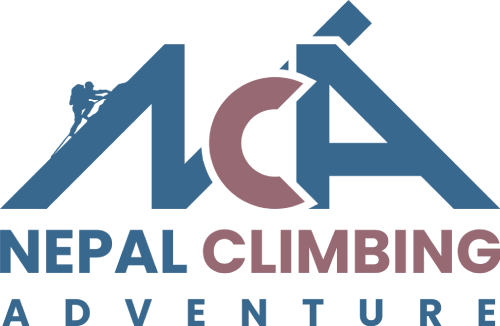
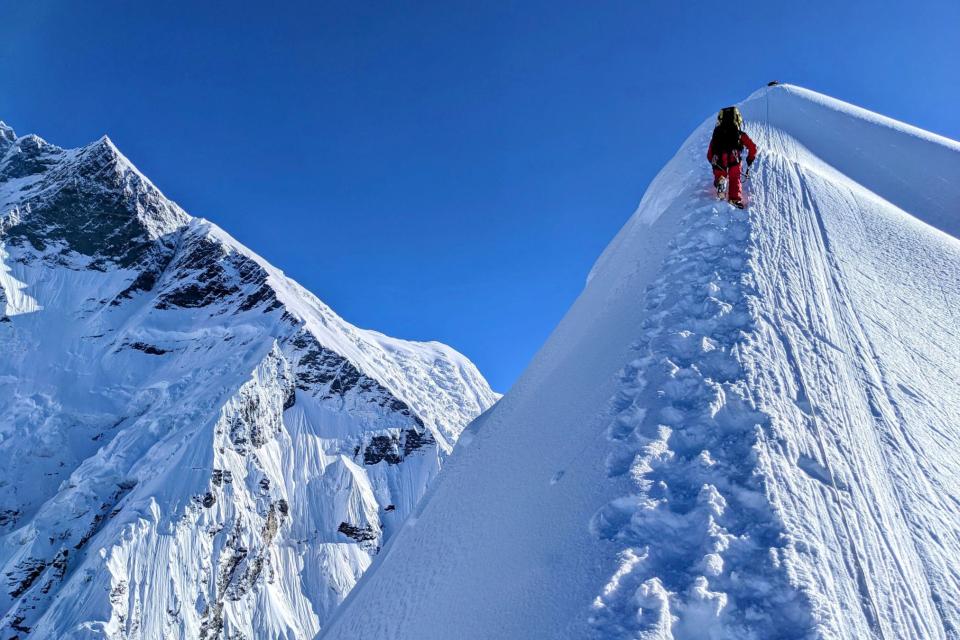
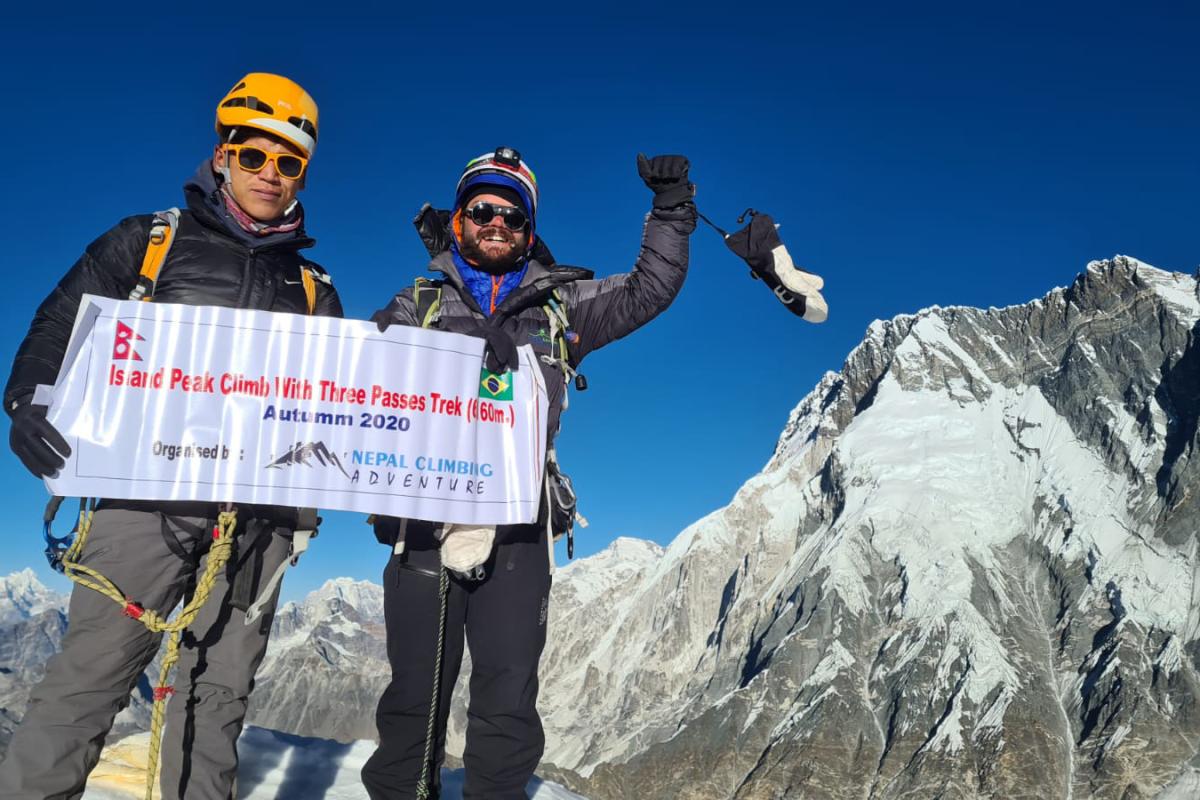
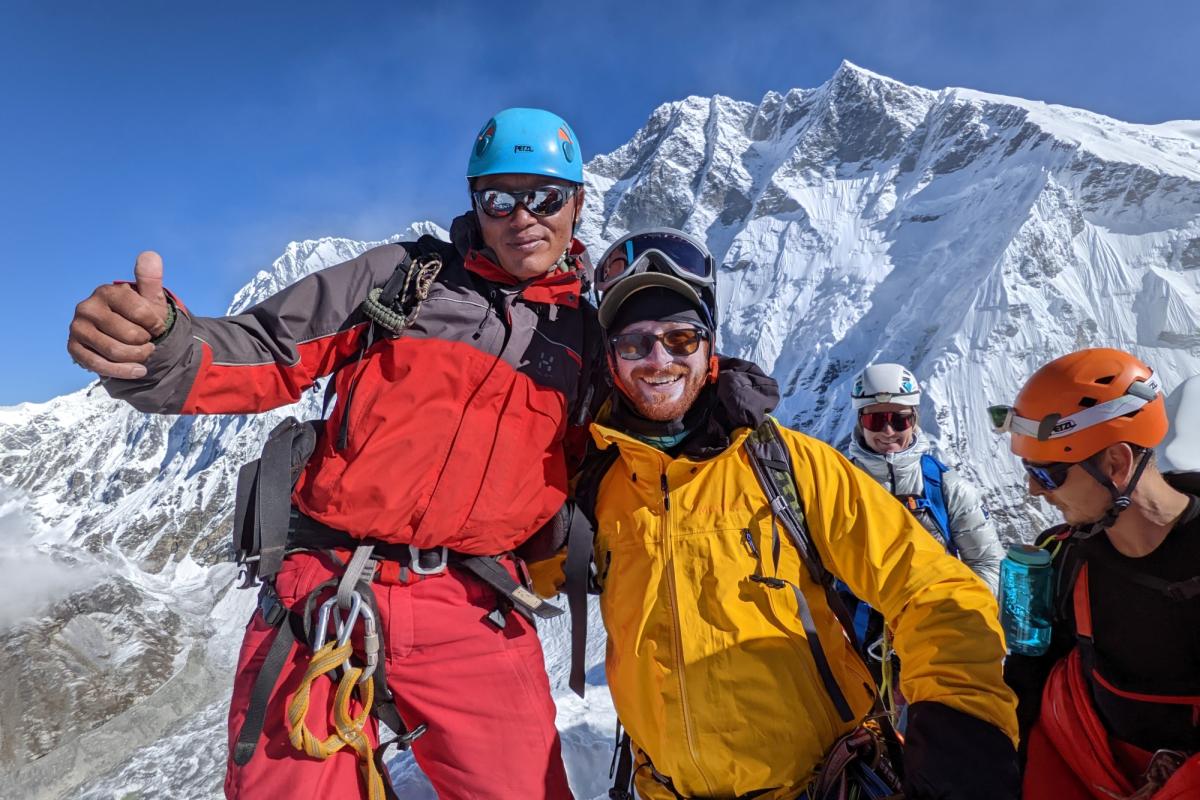
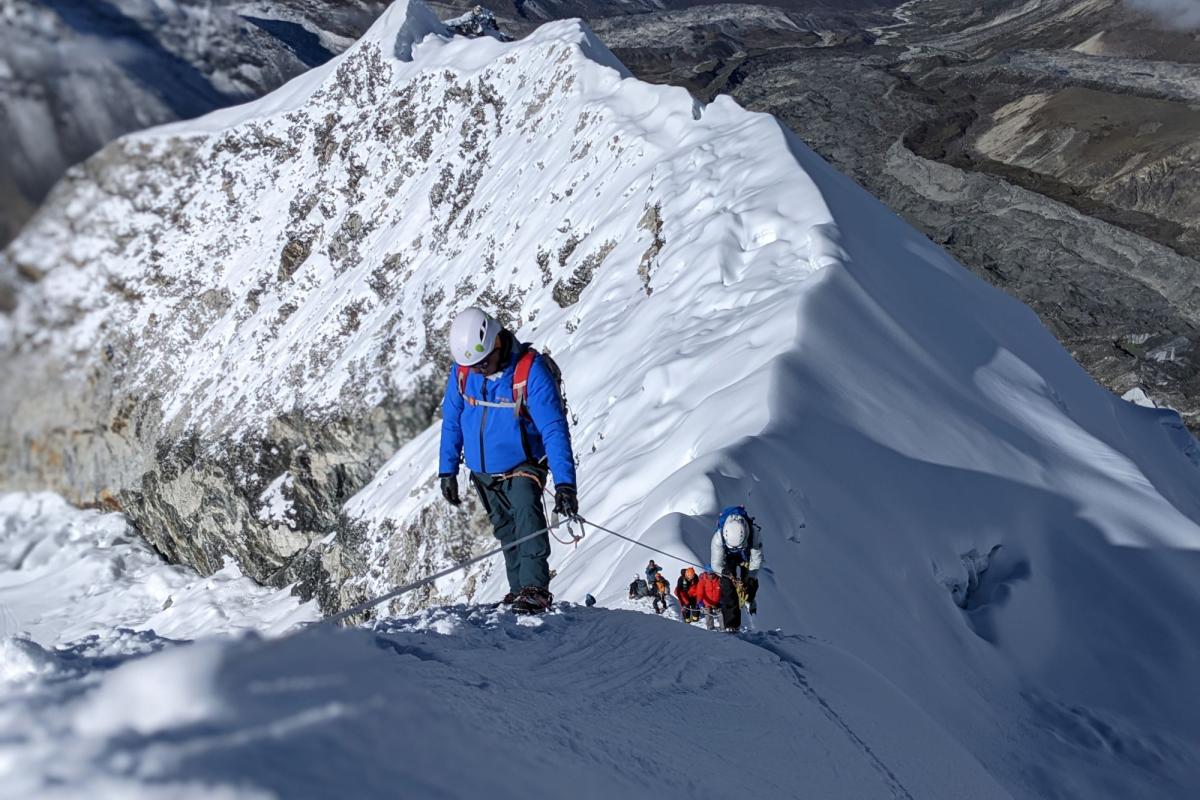
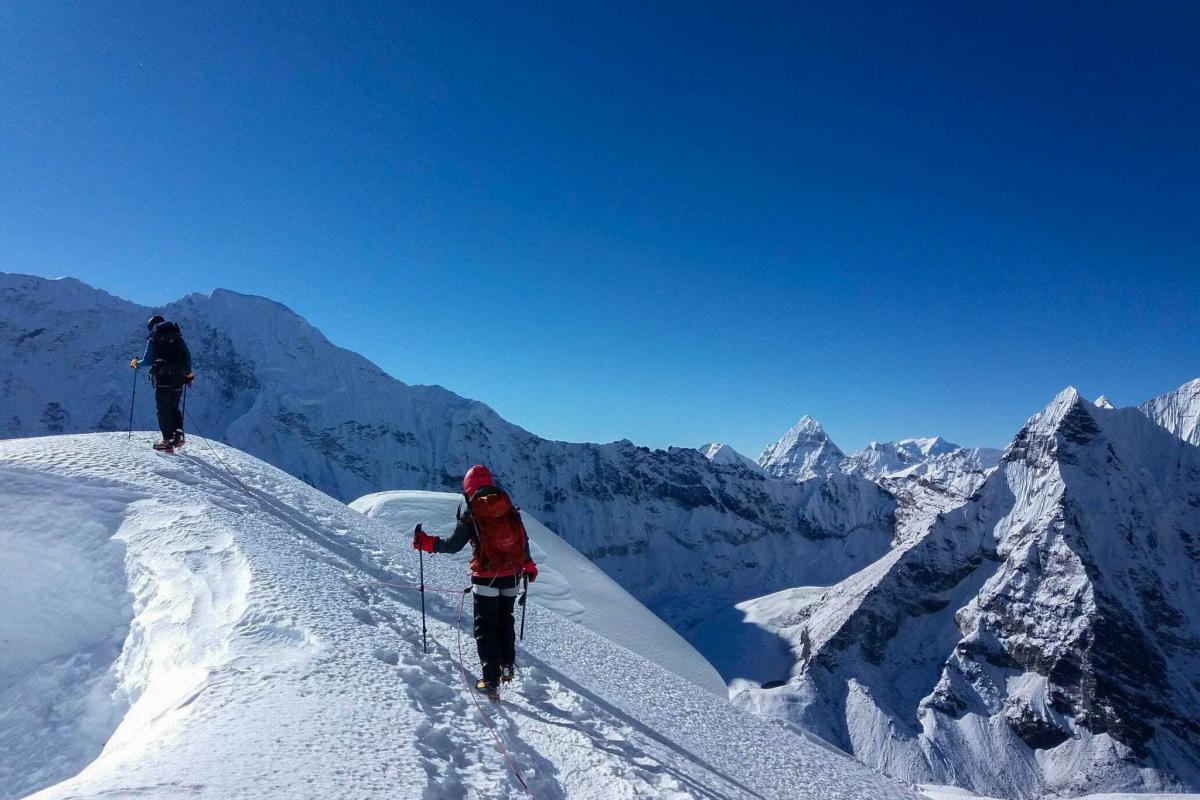
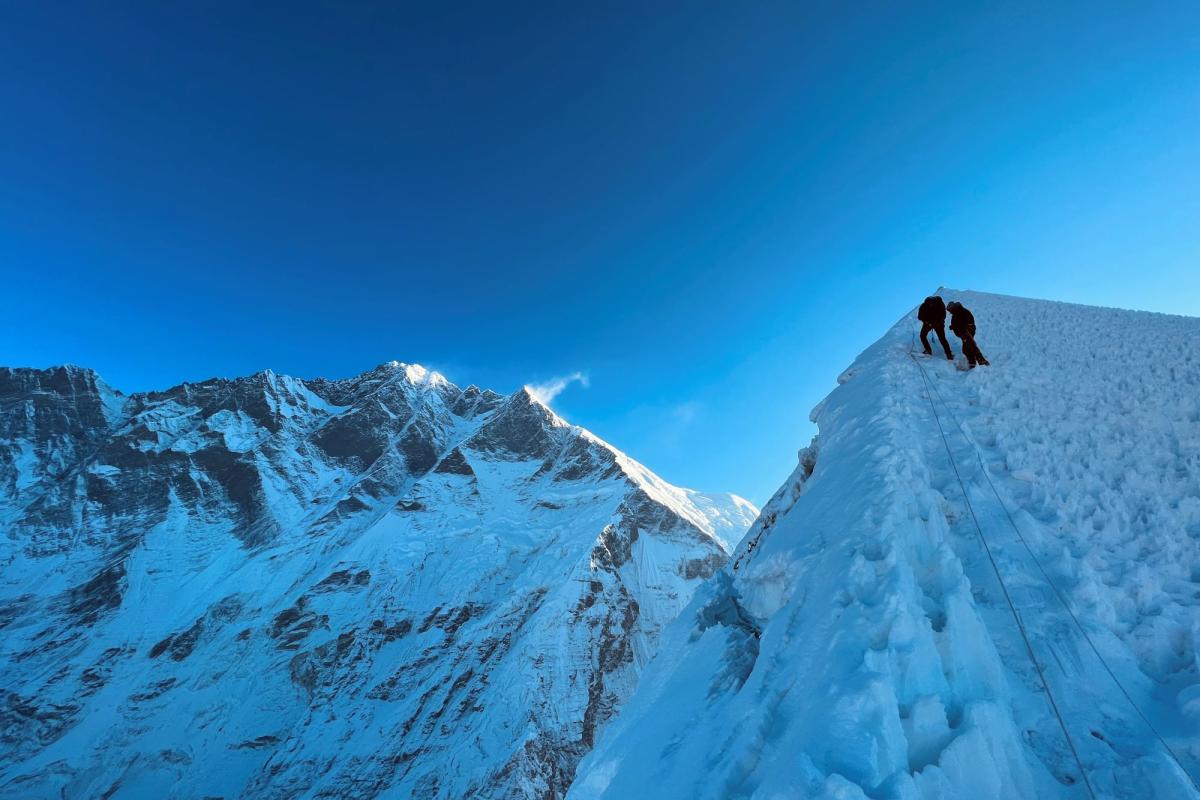
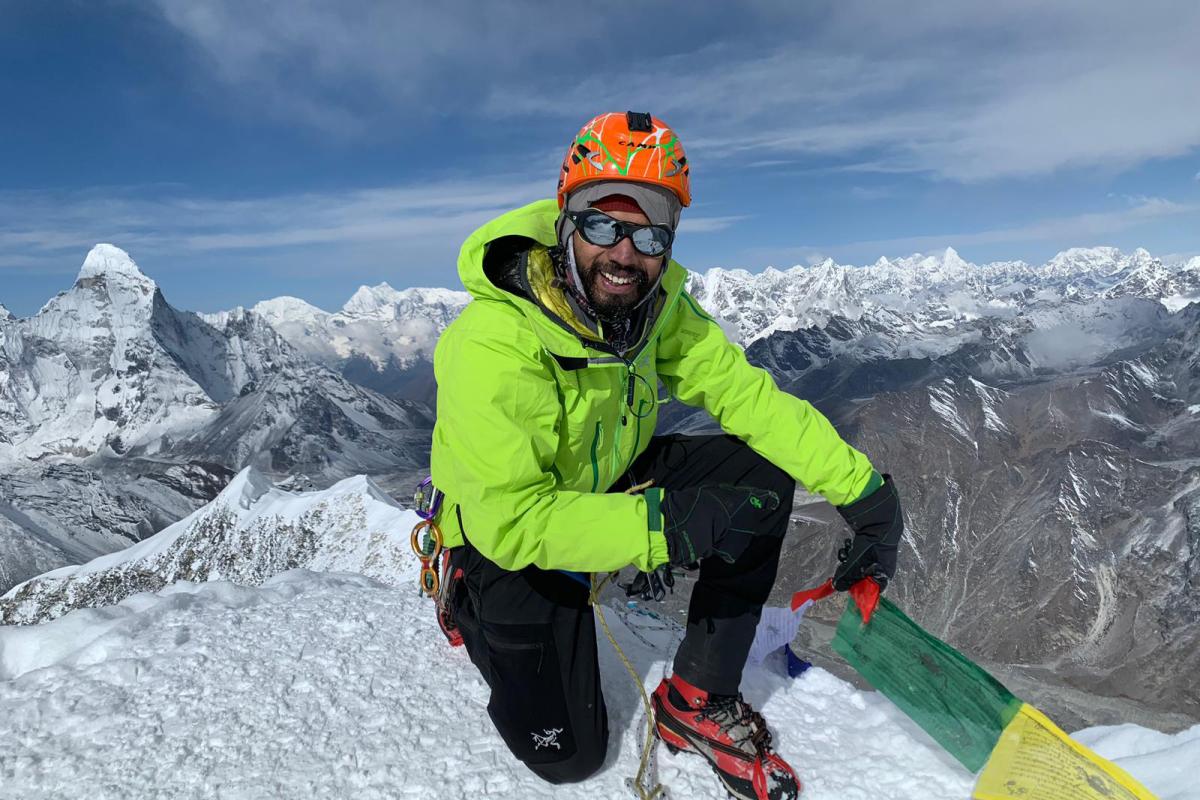
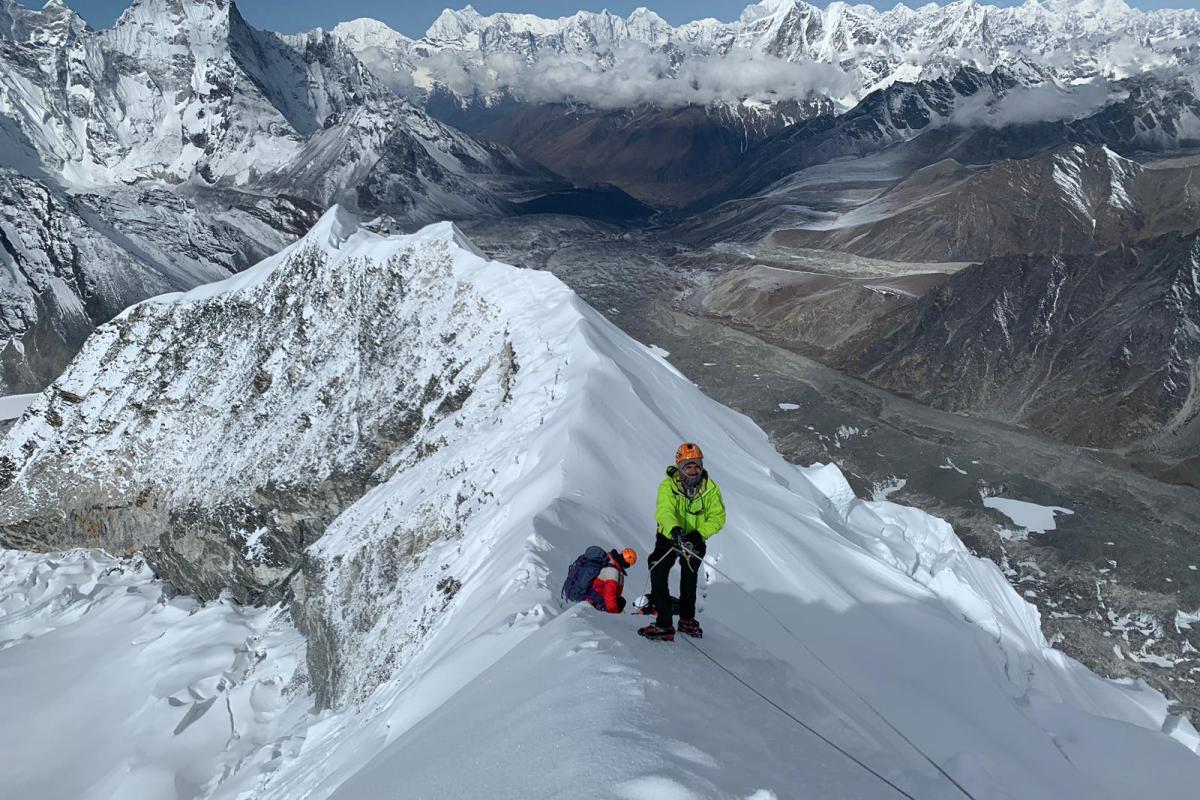
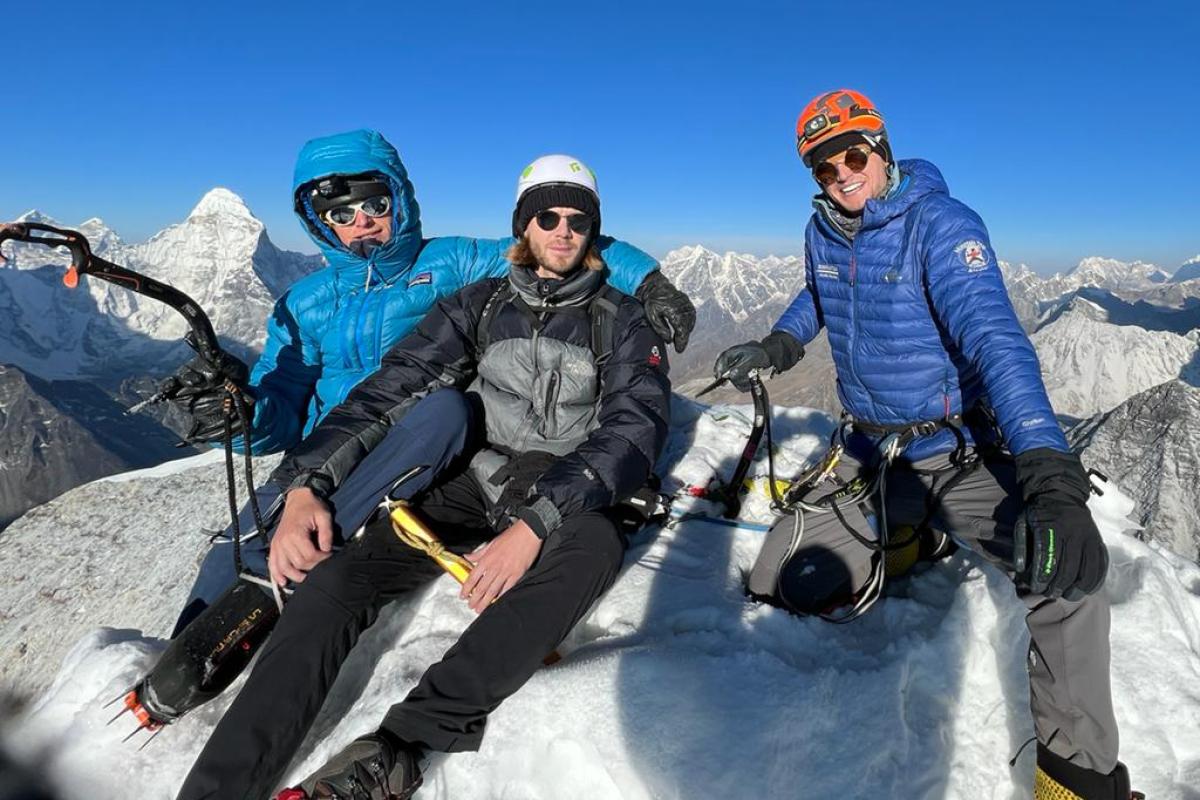
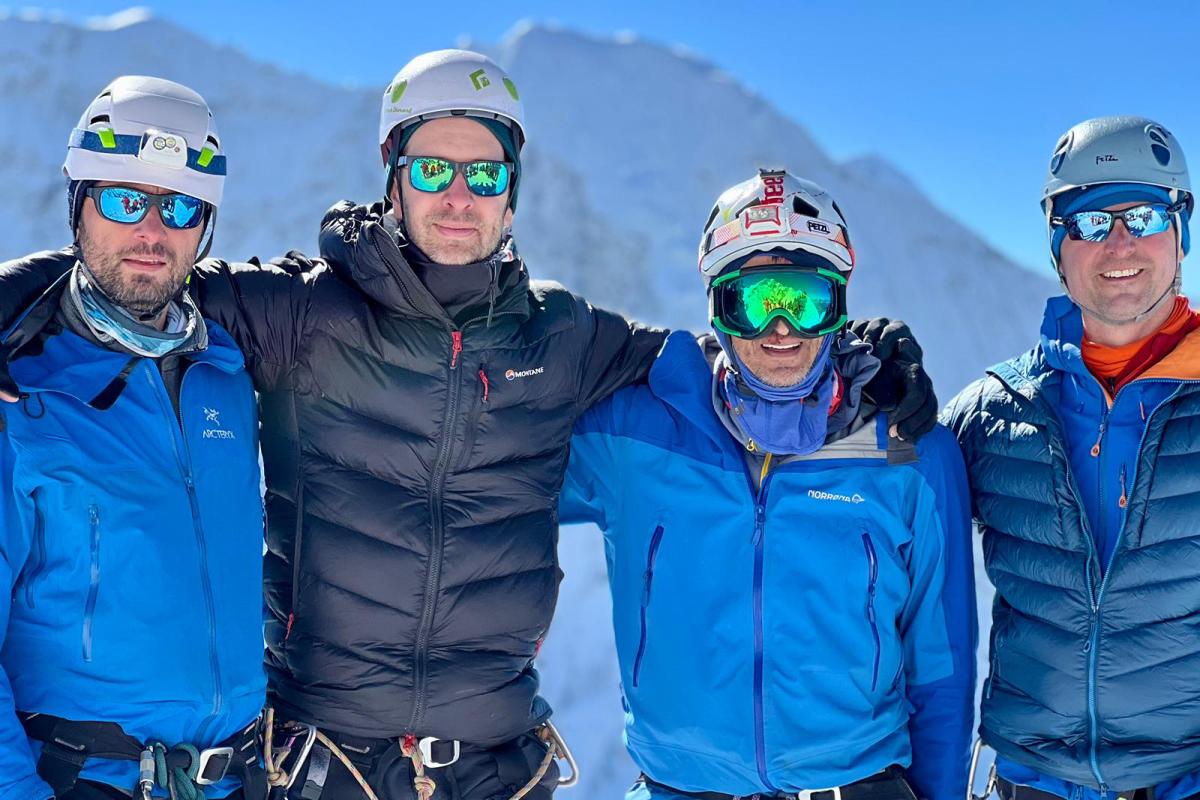
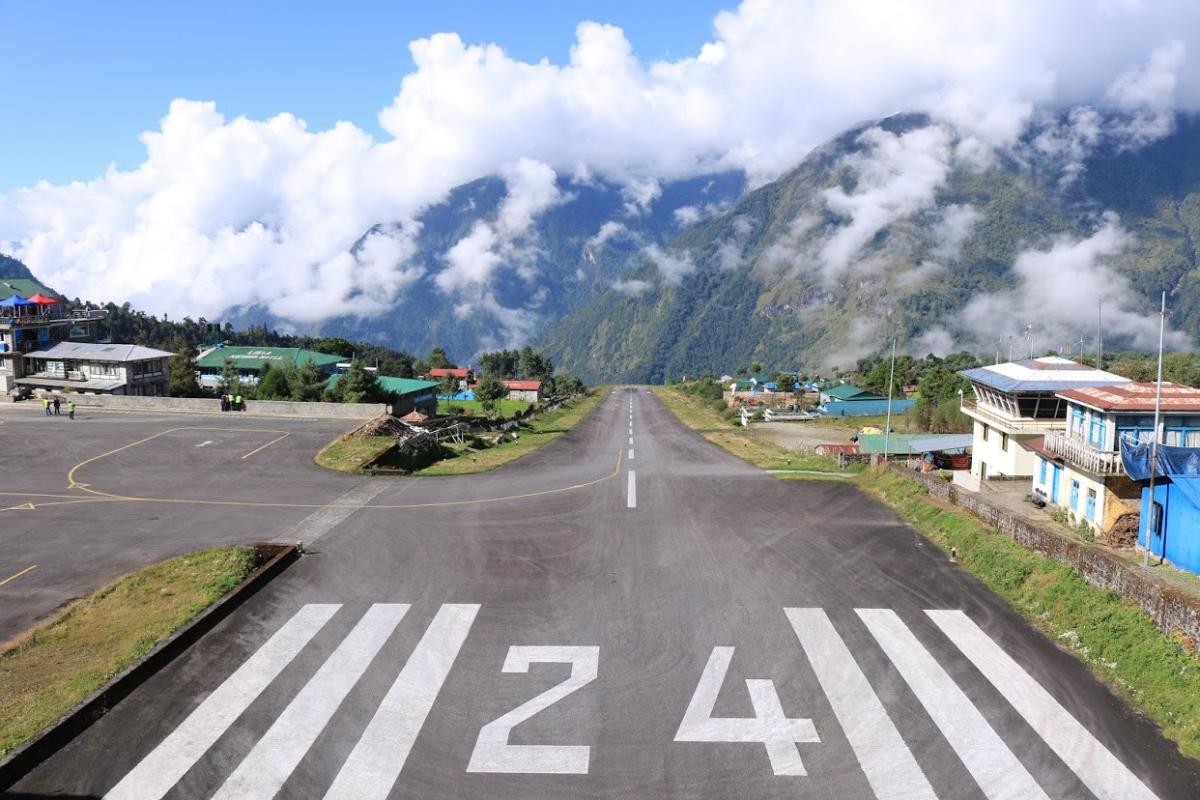
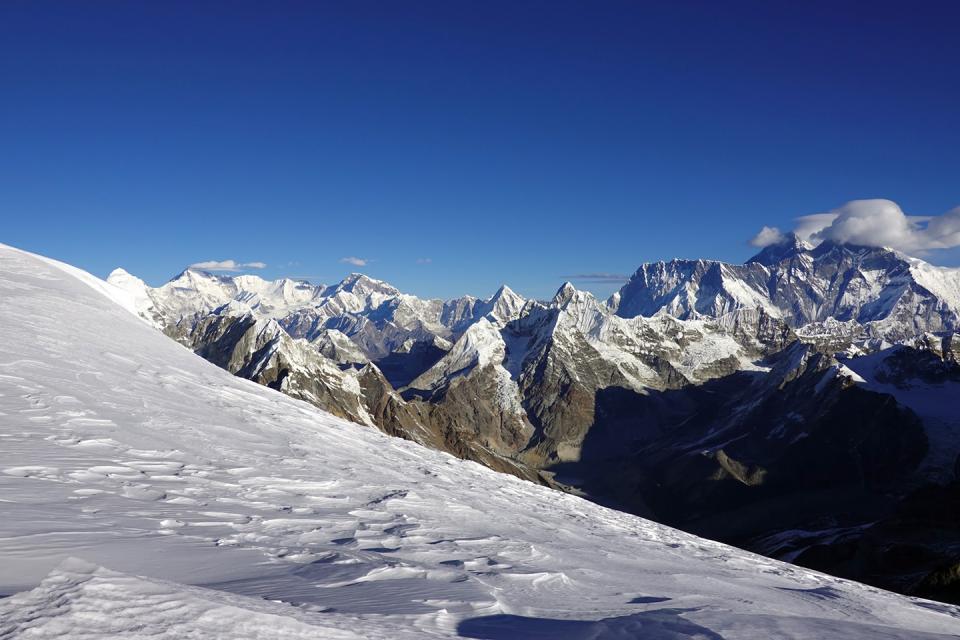
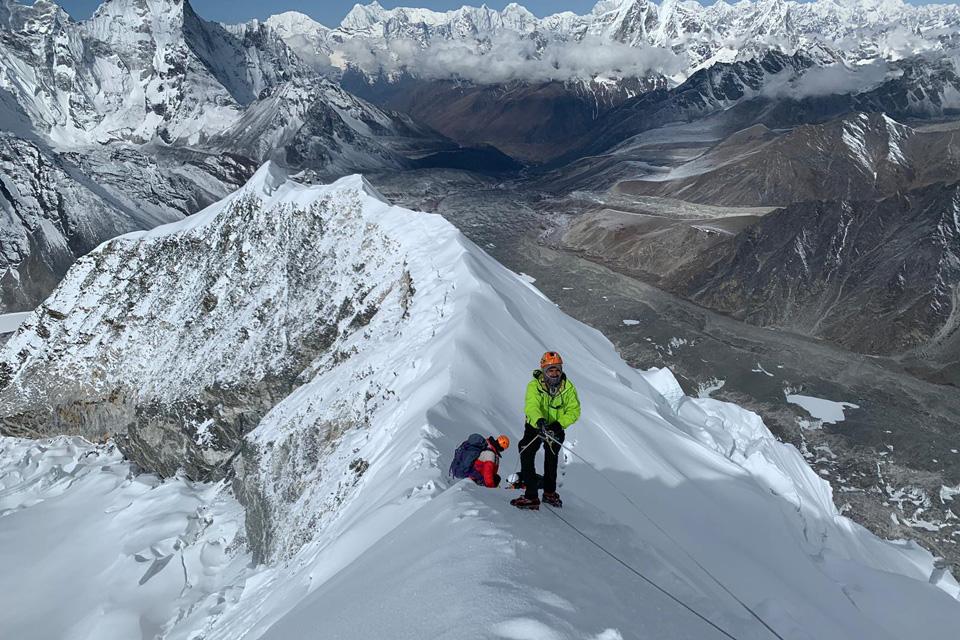
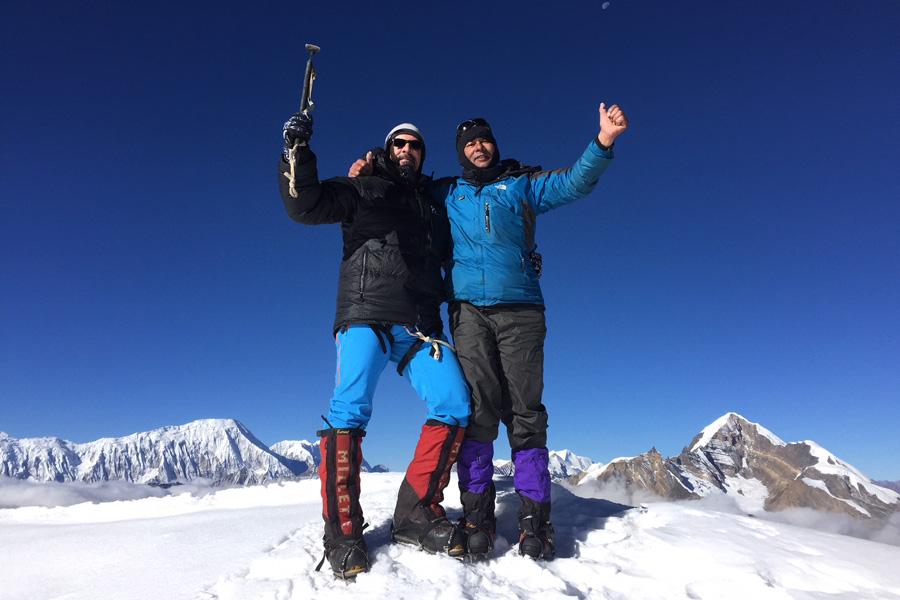
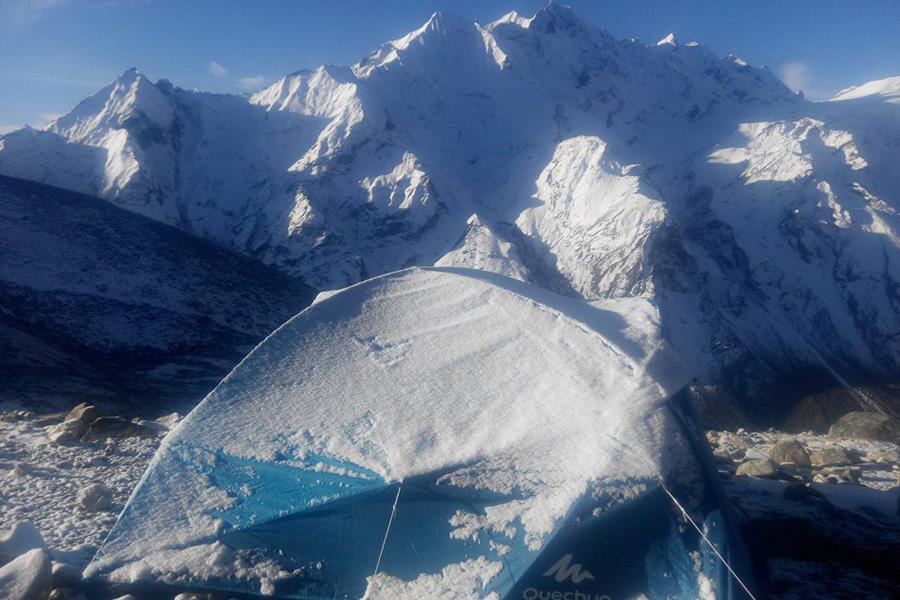
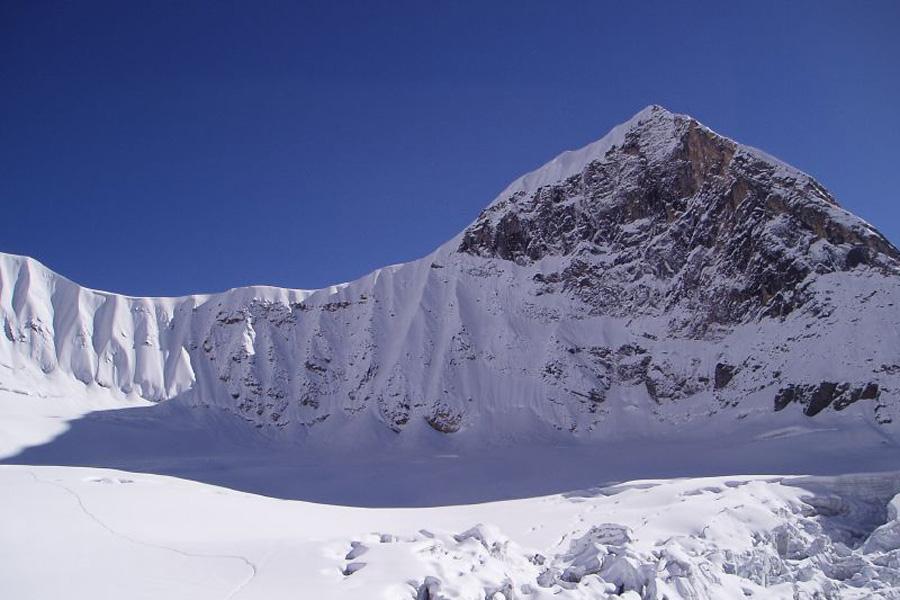
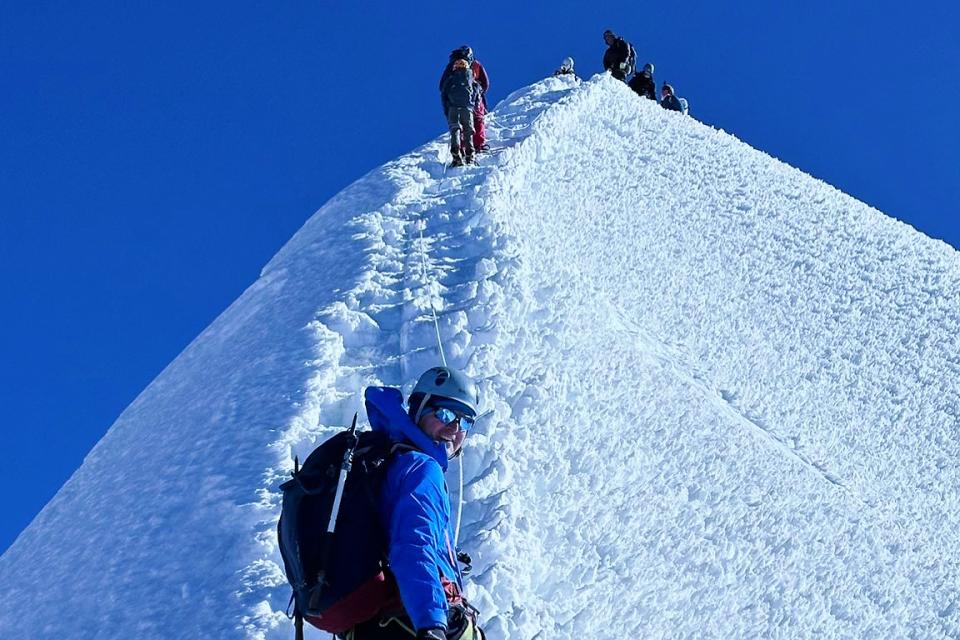


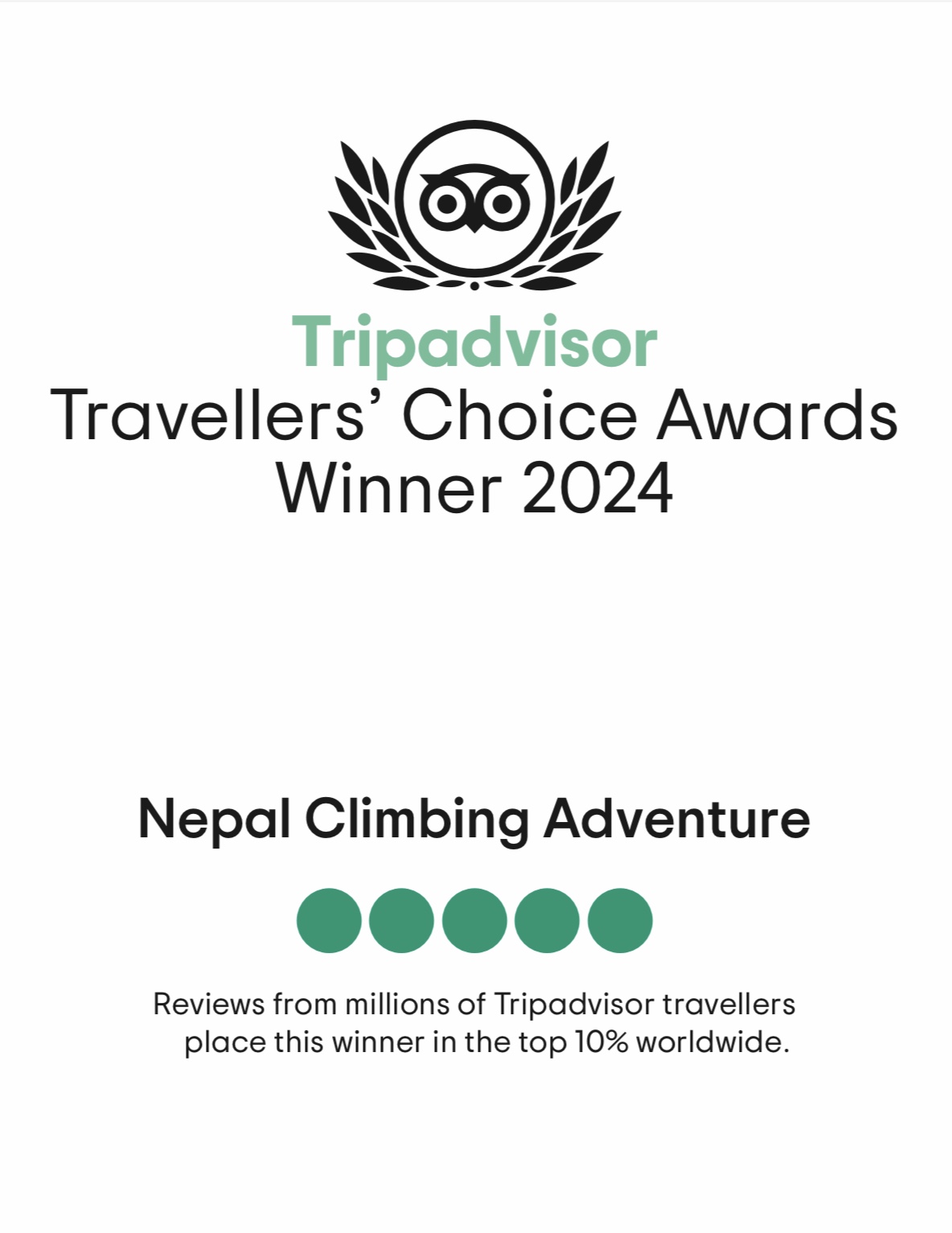
















 Chris Chhetri
Chris Chhetri